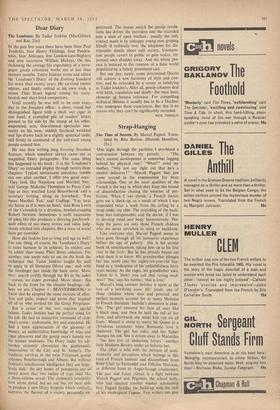Dear Diary
The Londoner. By Tudor Jenkins. (MacGibbon and Kee, 218.) IN the past five years there have been three Paul Tanfields, four Henry Fie'dings, four Penden- nises, four Atticuses, five London-Last-Nighters and nine successive William Hickeys. On this reckoning the average life expectancy of a news- paper gossip columnist works out at less than thirteen months. Tudor Jenkins wrote and edited the 'Londoner's Diary' of the Evening Standard for more than twenty years. He survived twelve editors, and finally retired at his own wish, a minor Fleet Street legend among his nasty, brutish and short-lived competitors.
Until recently he was still to be seen every day in the Standard office: a short, round but distinguished figure with a thick wet cigar in one hand, a crumpled pile of readers' letters pressed to his side by the stump of his other, amputated, arm, thin-rimmed spectacles inse- curely on his nose, reddish forehead wrinkled and lips drawn back in a slightly quizzical smile, still firmly in command of the awkward young people around him.
He was then writing long Evening Standard features, which somehow always came out as magnified Diary paragraphs. The same thing has happened to his book: it is the 'Londoner's Diary' on extended display through twenty-three chapters. Typical reminiscent anecdotes tumble out one after another. I offer two good ones: 'They look like Napoleon and Marshal Ney,' said George Malcolm Thompson to Percy Cud- ' lipp as they watched Lord Beaverbrook and a secretary trotting along on horseback; 'You mean Marshal Yea,' said Cudlipp. 'You treat my house as if it were an hotel,' said Rosa Lewis of the Cavendish to a drunken, brothel-creeping Robert Newton. Sometimes a swift succession of jokes like this produces a dizzying patchwork- quilt effect of too many stories and value judg- ments stitched into chapters. But a mass of social facts get recorded.
How did Jenkins last so long and age so well? For one thing, of course, the 'Londoner's Diary' is more humane to its subjects, its readers and its editor than many Fleet Street columns. For another, one needs only to use on the book the technique that Tudor Jenkins taught his staff to apply to all literature (Move one: stab with the forefinger just inside the back cover. Move two: search swiftly through the B's in the index —curses, no index provided. Move three: flip back to the front for the chapter headings—ah, here we are, Chapter 1: BEAVERBROOK) to know that he adopted the same mixture of affec- tion and guile, respect and terror that inspired all of us who worked for the Great Proprietor.
But a career of this sort requires special talents. Tucfor Jtnkins had the perfect mind for his job. He had an instinctive command of club- man's prose: undramatic, dry and anecdotal. He had a keen appreciation of the glamour of money, an authoritative knowledge of wine and cigar pleasures and the gossip man's fanatic eye for human weakness. The Diary under his edi- torship minutely chronicled the gentlemanly materialism of the City and St. James's. The tradition survives in the twin Telegraph gossip columns Peterborough and Albany. But without Jenkins's mischievous intelligence they are hope- lessly dull: the dry bones of pomposity are so Pared down that two inches of type read like a three-volume novel. The clubman's sensibility now seems dated, but no one has yet been able to produce a new Diary forniula which similarly captures the flavour of a society personally ex-
perienced. The insane search for gossip revela- tions has driven the recorders and the recorded into a state of open warfare: usually the only contact made is by unhappy young men groping blindly if ruthlessly over the telephone for dis- reputable details about cafd society. Unimpor- tant people cavort in public to gain notice, im- portant ones shudder away. And the whole pro- cess is reduced to the creation of a false world populated by a falsely prominent cast.
But one day, surely, some determined Diarist will achieve a new harmony of style and con- tent, and be rewarded by a career as satisfying as Tudor Jenkins's. After all, gossip columns deal with birth, copulation and death—the most basic elements of human existence. For compelling technical reasons it usually has to be a Duchess who undergoes these experiences. But this is no reason why they can't be significantly recorded.
NICK TOMAL I N


































 Previous page
Previous page